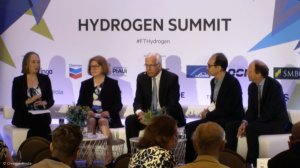JOHANNESBURG (miningweekly.com) – As iron-ore mining in South Africa, West Africa, the Pilbara, and Brazil happen to be hot and windy places, it makes a lot of sense for the global south to produce green hydrogen on site to reduce, deoxidise and pelletise iron-ore into an added-value product that can be shipped more efficiently.
Doing so will achieve for the global south the added value that the crude oil industry never delivered, the classic example being Nigeria, where crude oil is produced and sold for petrodollars and then reimported back into the country at five times the crude oil price, CWP Global strategy head Tom Dimitroff told the FT Hydrogen Summit covered by Mining Weekly. (Also watch attached Creamer Media video.)
“The same thing applies in the case of maritime bunker fuel. You’re not going to produce green hydrogen, ship it to Rotterdam and then have ships load it at Rotterdam. Basically, you co-locate refuelling stations approximate to that,” Dimitroff commented.
In terms of policy initiatives, the global north had, he said, been hugely responsive, with some 16 countries coming forward with policies and 700 green hydrogen projects. Backed by last year’s Inflation Reduction Act (IRA) announcement, green hydrogen projects are all set to proliferate further in the US.
“The US will satisfy a lot of its indigenous hydrogen offtake within the US itself – and they’ll have spare capacity to ship hydrogen.
“Another paradigm we need to look at is possible trading in electrolysers and other types of technology, and not just the trading of hydrogen.”
Platinum group metal-catalysed proton exchange membrane (PEM) electrolysers are used to produce green hydrogen and oxygen from water.
“We’re delighted with governments coming forward and starting to set firm prices that can catalyse decisions in the market – and the US IRA does that.
“I’m very much looking forward to other governments following suit, but on a more cooperative basis so there’s no zero-sum politics involved,” added Dimitroff.
AXE Group chairperson Christian Leysen, who is a member of the Chamber of Representatives of Belgium, also highlighted the advantage of on-site green hydrogen production to avoid transport costs.
“I think hydrogen will be best used when it is generated close to the industry using the hydrogen,” said Leysen.
EXPORTING GREEN HYDROGEN FROM SOUTH AFRICA
Oliver Rix, the energy partner of Baringa, a global consultancy focused on the energy transition, singled out the potential of South Africa, along with other countries like it, to produce and export green hydrogen effectively into Europe.
“But equally, if Europe can get its pipeline infrastructure right, then hydrogen can be moved from Iberia effectively into central Europe,” said Rix.
“If you start looking at the benefits that connecting hydrogen into electricity systems can provide, then that starts uncovering extra value.
“When you start looking at the potential renewables, the locations of demand and the potential for electrolysers to play a role in between those, then there is actually an economic case, even in a place like Japan,” added Rix.
In the UK, hydrogen is seen as a commodity able to generate considerable economic growth: “It was only when in 2019, when we did the report looking at how we get to net zero that suddenly we needed hydrogen. So, we are talking about the last 20% of decarbonisation," said Baroness Brown, a Cambridge House of Lords crossbench member.
“When you look at that, even in the UK, it means an amount of energy from hydrogen that’s approaching the scale of the electricity system that we have today. That’s building a big industry. Even if you halve the numbers, it’s a big requirement,” the baroness added.
EMAIL THIS ARTICLE SAVE THIS ARTICLE ARTICLE ENQUIRY
To subscribe email subscriptions@creamermedia.co.za or click here
To advertise email advertising@creamermedia.co.za or click here










